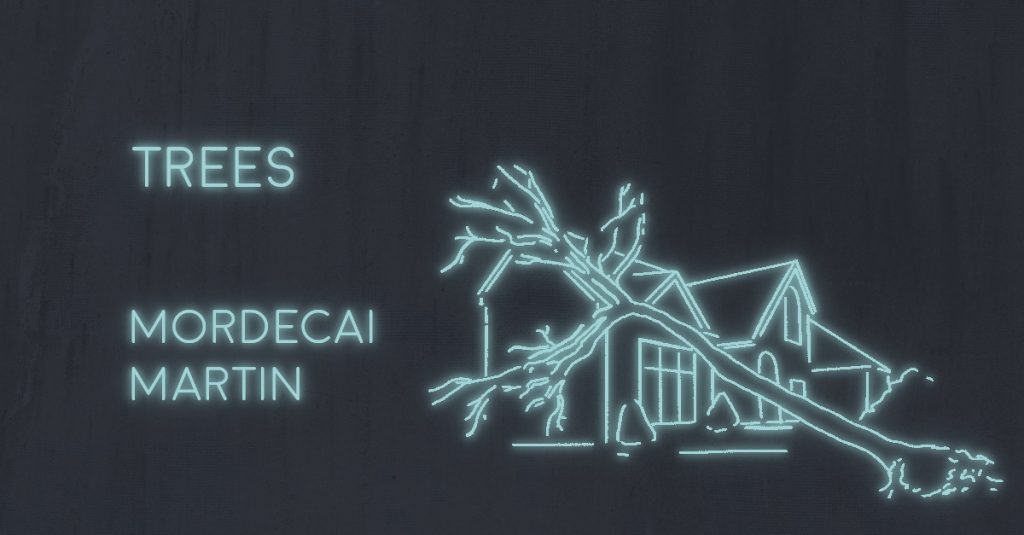Sometimes the world falls away. Oh well! So long, World! I have a small house, though not so small that we would call it tiny. It’s just a quiet little place where no one but the bank can throw us out, and where we can play host to some friends in need. I look outside my window at the tree shaking in the wind, and I think about it falling down, crashing through my door. I suppose this is what I am most afraid of in a world that has gone wild: that it will intrude upon the small, calm place I call home. The world’s cruel sanity will come for my gentle madness.
Madness rules the day here. We stack the dishes willy nilly, and the glasses don’t match—my wife insists on washing all the jam and pickle jars. We could drink out of them, she says. So we drink out of them, Baruch Hashem, there’s still plenty to drink. We had some trouble with the water bill, but it’s all cleared up now, I think. The liquor store doesn’t deliver, a sensible if inconvenient policy, so we wander down the street and pick up our bottles and put them down when they are empty. It keeps the pain down if we keep our liquor down.
The other day a friend dropped by and said he wanted to talk about Jewish writing. Very well then, I said, what is there to talk about Jewish writing? I was suspicious because I’ve known this friend some time, I know when he’s hot under the collar about something, and that day, I could have put a kettle on his collarbone and gotten a nice cup of tea going. Well, you’re a Jewish writer, he said. Well, I’m a Jew and a writer, I demurred.
Cut the bullshit, Joe, he said, you’re a Jewish writer and so am I and what are we going to do about all this?
All what, I asked, innocently enough, but with a sinking feeling that my tree had collapsed.
Cut the bullshit, Joe, all this! He pointed out the window, and I suppose, in a gesture he considered sweeping, to the wide world of horrors.
I shrugged. I can’t deny that something needs to be done. But what should we do? I asked my friend. What can we do but write?
But we’re JEWISH writers, he insisted. And how are we going to write about this?
I gave it some thought.
Eventually, I spoke up and said, there’s a story Rebbe Nachman of Breslau wrote about the son of a sage who can’t walk but can stand. That is, the son can’t walk but can stand. The sage—
Joe, my friend said, with a less than patient air.
No, listen, I said. The sage is dying. He gathers the son who can’t walk but can stand and his brothers and tells them, on his deathbed, that they must water all trees, all the days of their life, whatever else they do. So the brothers go out, they send money back home to their disabled brother. I mean, the story says “crippled” but I don’t like that word.
Joe, c’mon, I’m trying to ask for your thoughts.
I looked at my friend a while. He can be impatient with stories from my yeshiva days, like a lot of the friends I have. They’ll say, Joe, you’re preaching, talk to me, don’t preach. And they have a point.
Okay, I shrug. The point is, this son who can’t walk, he goes on some adventures. These adventures are difficult to hold in my head, I always think of them as details, mystical details. But ultimately he finds a magical tree in a land of demons. The demons are an allegory for humanity, they squabble and fight. Eventually, the demons distract everyone from watering the magic tree. The world collapses, everyone’s killed, and the tree gets watered. Do you see what I’m saying?
My friend was annoyed. Joe, I came over here to talk about the responsibilities of the Jewish writer in these times.
I said, I know, and that’s why I told you that story. You know what the responsibility of the Jewish writer is? It is to remember the mystical details. It is to make strange prophecies from the deathbed of sages. It’s to squabble and fight and fill time until the world collapses, at which point, it won’t matter what we did.
We argued late into the night, but eventually my friend got an answer he liked and left, out into the sour darkness. I looked at my reflection in the dark square of my window and thought about a tree crashing through it. One day the world’s cruel sanity will come for my gentle madness. And the tree gets watered all the same.

